We are closing this live blog now, but you can keep up to date on all the latest developments on our new live blog below.
India and Pakistan to reimpose local lockdowns – as it happened
Global cases pass 8 million; WHO says Beijing cluster tops 100 infections; Covid-19 mutation increases chance of infection, says study. This blog is now closed. Follow our live coverage below
Mon 15 Jun 2020 19.46 EDT
First published on Sun 14 Jun 2020 19.31 EDT- Global Covid-19 cases pass 8 million
- Chile extends state of catastrophe by 90 days
- New infections in Turkey double from early June
- FDA revokes emergency use of malaria drug Trump touted as coronavirus treatment
- Summary
- Over 100 cases in new Beijing Covid-19 outbreak: WHO
- Pakistan to seal city areas across country to stem quickening virus spread
- New York to allow gatherings of up to 25 people - Cuomo
- Swiss order temperature checks for travellers from Sweden
- BP expects to take $17.5bn hit due to coronavirus writedown
- India to reimpose lockdown on 15m people in Chennai
- Covid-19 mutation increases chance of infection - study
- Virus impact could kill over 50,000 children in Middle East and North Africa
- Norway to halt Covid-19 track and trace app over data protection concerns
- Summary
- English shops, attractions to reopen as virus lockdown eased
- Beijing closes 10 new residential compounds as new cases confirmed
- Hong Kong's Disneyland to reopen on 18 June
- China reports 49 more virus cases as Beijing tests thousands
- Colombia cases top 50,000
- Demand for flu vaccine soars as countries plan for second Covid-19 wave
- UK retailers call on shoppers to buy from local shops
- UK economy to shrink by 8% in 2020, forecasters say
- Republicans insist Trump Tulsa rally won't spread coronavirus – despite local concern
- WHO cautions against further lifting of lockdown in England
- Beijing has entered an 'extraordinary period' says city spokesman
- Summary
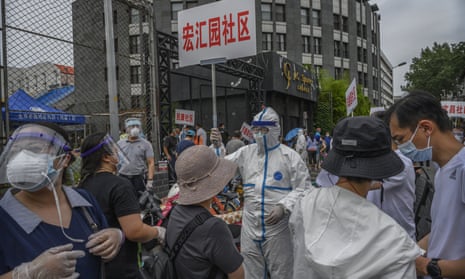
Live feed
- Global Covid-19 cases pass 8 million
- Chile extends state of catastrophe by 90 days
- New infections in Turkey double from early June
- FDA revokes emergency use of malaria drug Trump touted as coronavirus treatment
- Summary
- Over 100 cases in new Beijing Covid-19 outbreak: WHO
- Pakistan to seal city areas across country to stem quickening virus spread
- New York to allow gatherings of up to 25 people - Cuomo
- Swiss order temperature checks for travellers from Sweden
- BP expects to take $17.5bn hit due to coronavirus writedown
- India to reimpose lockdown on 15m people in Chennai
- Covid-19 mutation increases chance of infection - study
- Virus impact could kill over 50,000 children in Middle East and North Africa
- Norway to halt Covid-19 track and trace app over data protection concerns
- Summary
- English shops, attractions to reopen as virus lockdown eased
- Beijing closes 10 new residential compounds as new cases confirmed
- Hong Kong's Disneyland to reopen on 18 June
- China reports 49 more virus cases as Beijing tests thousands
- Colombia cases top 50,000
- Demand for flu vaccine soars as countries plan for second Covid-19 wave
- UK retailers call on shoppers to buy from local shops
- UK economy to shrink by 8% in 2020, forecasters say
- Republicans insist Trump Tulsa rally won't spread coronavirus – despite local concern
- WHO cautions against further lifting of lockdown in England
- Beijing has entered an 'extraordinary period' says city spokesman
- Summary
Global Covid-19 cases pass 8 million
Global coronavirus cases have passed 8 million, according to the Johns Hopkins University tracker. Cases now stand at 8,001,138, with deaths at 434,849.
The US accounts for more than a quarter of all cases, with 2,110,736 infections. It has 116,090 deaths.
Brazil is the next biggest hotspot, with 888,271 cases and 43,959 deaths.
Russia is third in terms of infections, with more than 530,000 cases. But the country has only recorded 7,081 deaths officially attributed to Covid-19.
Meanwhile, Beijing has ramped up testing and reintroduced restrictions in some areas after a new cluster of cases in the capital linked to a wholesale food market. All indoor sports and entertainment venues in Beijing were shut down on Monday as authorities raced to contain the outbreak.
The mayor of the city of Austin in the US state of Texas, Steve Adler, tweeted Monday that he is extending stay-at-home orders to 15 August, as the number of Covid-19 hospitalisations increase statewide.
The order “strongly encourages” reopened businesses to operate at an indoor capacity of 25 per cent or below, but is not mandatory, Adler said, since the state’s governor, Greg Abbott, has allowed restaurants in Texas to operate at 75 per cent capacity and other businesses, like barbershops and gyms, to be open at 50 per cent capacity.
Abbott has also said people cannot face legal ramifications for not wearing masks, but strongly advised people to wear them.
“It’s pretty simple,” Adler said. “Wear a mask when you go outside, and don’t go places where people aren’t wearing masks.
“The community gets to make this choice. We get to decide how important it is that we try to protect those around us.”
Texas reported a record high number of Covid-19 hospitalisations on Monday of at least 2,326 people.
There have been at least 89,108 cases of Covid-19, and at least 1,983 deaths in the state, according to CNN.
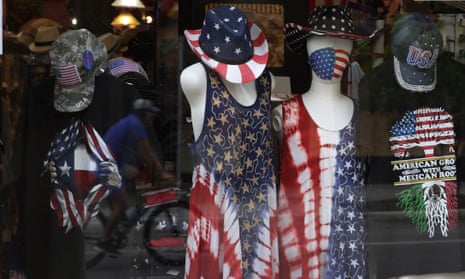
US airline passengers who refuse to wear facial coverings could have their flying privileges revoked, the industry’s main lobby group said on Monday.
As of now, major US airlines may deny anyone not wearing a mask from boarding and provide the coverings to passengers who have none, according to Reuters.
Once on board, however, flight attendants have little power to enforce the policy if passengers remove their masks.
The US government has no mandate on the matter. Carriers implementing the new policy include Alaska Airlines, American Airlines, Delta Air Lines, Hawaiian Airlines, JetBlue Airways, Southwest Airlines and United Airlines, Airlines for America said in a statement.
The measures are expected to remain in place throughout the Covid-19 public health crisis, it said.
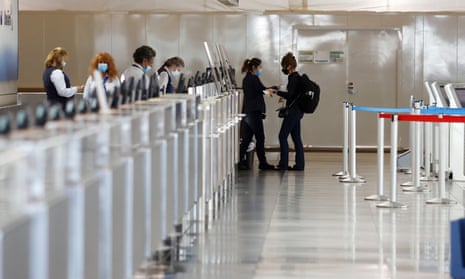
Brazil registered 627 new deaths from Covid-19 on Monday, the health ministry said, with a new total of 888,271 confirmed cases of coronavirus, after about 20,000 new infections were reported.
The country continues easing restrictions in several states despite the severity of the outbreak, which is now the second-worst in the world after the United States.
Monday’s new fatalities are down from an average of nearly 1,000 over the past week, though reporting of deaths typically slows over the weekend.
Although Brazil’s official death toll from the pandemic has risen to 43,959, the true impact is likely far greater than the data show, health experts say, because of a lack of widespread testing in Latin America’s largest country.
Brazil’s education minister, Abraham Weintraub, was fined for failing to wear a face mask on Sunday while attending a rally for president Jair Bolsonaro, who has himself repeatedly flouted the capital’s masks-in-public rule.
He shook hands and posed for pictures with demonstrators, many of whom also went without masks.

A group of 21 travellers arrested on suspicion of violating Hawaii’s coronavirus quarantine order have agreed to leave the state because of threats from residents, a member of the group said Monday.
The group, known as Carbon Nation, which one of the members, Kendra Carter, described as a nature-loving family, were so excited to experience Hawaii that they decided to stop at the beach before going to their Big Island rental home, she said, according to the Associated Press.
Hawaii’s mandatory 14-day quarantine doesn’t allow travellers to leave a residence or hotel room for any reason except medical emergencies.
Carter said some of the harassment involved death threats.
“People started rolling up to our house calling us all types of names,” she said. “Telling us to starve and a whole bunch of stuff. We’ve been getting death threats in our inboxes.”
Carter said the group didn’t realise that the quarantine on all people arriving in the state would be strictly enforced.
North Macedonian political parties on Monday agreed to have parliamentary elections on 15 July despite a persistent level of new coronavirus infections, a move seen as a crucial step for the country’s EU membership bid, Reuters reports.
The elections in the landlocked Balkan country and newest NATO member will also be a test of support for the pro-EU policies of the Social Democrats of former prime minister Zoran Zaev.
After talks with Hristijan Mickoski, the head of the main opposition and nationalist VMRO-DPMNE party, Zaev said the country needed a functional government to deal with the pandemic and before the autumn because of the possibility of another surge in coronavirus infections.
North Macedonia’s economy is forecast to contract 3.5 per cent this year and is expected to return to growth in 2021.
“We cannot bear a bigger crisis than this with a technical government and without a parliament,” Zaev told reporters.

A transitional government had initially scheduled a snap parliamentary election for 12 April but postponed it.
Coronavirus has so far infected 4,157 people in North Macedonia and killed 193.
Last week, the republic lifted a state of emergency introduced in March to contain the outbreak.
Death rates are 12 times higher for coronavirus patients with chronic illnesses than for others who become infected, a new US government report says.
The Centers for Disease Control and Prevention report released Monday highlights the dangers posed by heart disease, diabetes and lung ailments, the top three health problems found in Covid-19 patients.
The report is based on 1.3 million laboratory-confirmed coronavirus cases reported to the agency from 22 January through the end of May.
Information on health conditions was available for just 22% of the patients. Of those, 32% had a heart-related disease, 30% had diabetes and 18% had chronic lung disease, which includes asthma and emphysema.
Among patients with a chronic illness, about 20% died compared with almost 2% of those who were otherwise healthy.
Virus patients with a chronic condition were also six times more likely to be hospitalised (46% versus almost 8%).
People with chronic disease “are much more likely to suffer severe effects of Covid-19, but we can’t lose sight of the fact that previously healthy people can also become very ill and even die as well,” Leana Wen, an emergency physician and public health specialist at George Washington University, said in a statement, according to the Associated Press.
Race and ethnicity data, available for just under half of patients, show 36% were white, 33% Hispanic, 22% black, 4% Asian and about 1% American Indian.
Though the numbers are incomplete, they echo other reports that found minorities have been disproportionately affected by the pandemic.
Among patients aged 80 and up who died, half had a chronic illness.
Roughly equal numbers of men and women were infected, but men were more likely to have severe cases, the report found.
South Africa’s president Cyril Ramaphosa on Monday condemned a surge of femicides since his government eased anti-coronavirus stay-at-home measures as “barbaric” and “acts of inhumanity”.
Murders of women have spiralled since the start of June, when lockdown restrictions were loosened, allowing for more movement of people, according to the police.
Speaking at a virtual African National Congress meeting, Ramaphosa said gender-based violence “continues to plague our country and we have been saddened by the continuous and recurring news of men attacking and killing women in the past few weeks,” Agence France-Presse reports.
“Men continue to kill women in the most horrific and barbaric fashion,” he said, emphasising that “it must end”.
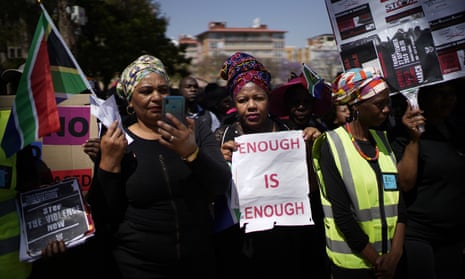
In a weekly newsletter earlier, the president described the attacks as “acts of inhumanity”.
The victim of one of the most gruesome attacks was an eight-months pregnant woman whose stabbed body was found hanging from a tree in Roodepoort, a western suburb of Johannesburg.
Five days later, the body of another young woman was found on Friday dumped under a tree in Soweto.
Police have reported several other cases of femicide across the country in recent days.
The reasons for the sudden increase are being investigated. Police minister Bheki Cele has said that an overall rise in crime was caused by the lifting of a ban on the sale of alcohol.
On Saturday, Ramaphosa had referred to the past week as “a dark and shameful week for us as a nation”.
“We note with disgust that at a time when the country is facing the gravest of threats from the pandemic, violent men are taking advantage of the eased restrictions on movement to attack women and children,” he said in a statement.
In September 2019, femicide was declared a national crisis.
Hundreds of Cuban doctors and nurses who were sent to Mexico City to help respond to the pandemic could stay longer if cases keep rising, a senior government official said.
In May, 585 healthcare workers from the island nation arrived in Mexico City, epicenter of the pandemic in Mexico. It marked one of the largest medical crews that Cuba, which dispatches doctors around the world, has sent to tackle the pandemic.
Mexico City health minister Oliva Lopez said the Health Institute for Wellbeing (Insabi) is paying the Cuban health ministry 135 million pesos ($6.03 million), Reuters reports.
Biomedical engineers and epidemiologists have also been deployed, she said.
Mexico City has almost 37,000 confirmed cases of coronavirus, about 25 per cent of the national total.
Mexican health officials have said the country is short about 6,600 doctors and 23,000 nurses to properly respond to the pandemic.
Despite having hired more than 2,000 doctors and nurses, Mexico City still does not have enough health personnel, Lopez said.
Cuba has agreements with almost 70 countries to send doctors and other medical professionals.
Few details about the deals are known, but under an agreement with Brazil that was in place through 2018, the Cuban government kept 80% of what it charged for each doctor, according to Brazilian health officials.
United Nations officials said in November that the conditions under which Cuban doctors work could be considered “forced labor”, but Lopez defended the use of Cuban health care workers.
All indoor sports and entertainment venues were shut down in China’s capital Beijing on Monday as authorities raced to contain a fresh coronavirus outbreak linked to a wholesale food market, with some neighbourhoods placed under complete lockdown.
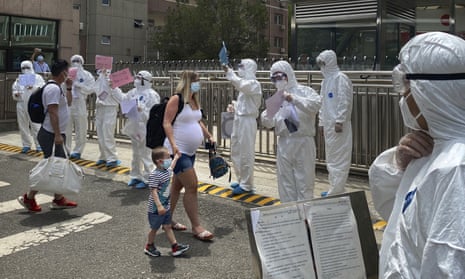
Tens of thousands of people were also targeted in a massive test and trace programme, according to Agence France-Presse.
As we reported earlier, the World Health Organization said that more than 100 cases had been confirmed so far.
The outbreak came after China had largely brought the virus under control following its emergence in the central city of Wuhan late last year, highlighting the global risks associated with a second wave of infections.
Chile extends state of catastrophe by 90 days
Chile´s government said on Monday it would extend a state of catastrophe in place since mid-March by 90 days, in response to a surge in infections in the South American nation.
The pace of new infections has increased dramatically in May and June, averaging over 5,000 daily in recent weeks, filling critical care wards and prompting authorities to declare a full lockdown in the capital Santiago, a city of more than six million.
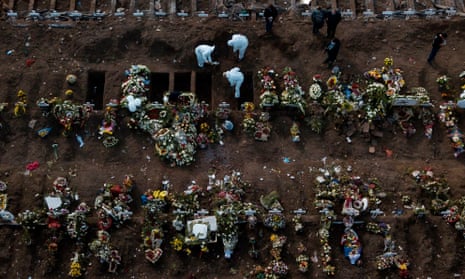
The state of catastrophe, extended by presidential decree, gives the government extraordinary powers to restrict freedom of movement and assure food supply and basic services, Reuters reports.
Quarantine measures are routinely enforced by soldiers in Santiago. South America has become the new epicenter of the global coronavirus crisis, with Peru, Brazil and Chile particularly hard hit.
Chile has recorded nearly 180,000 infections and more than 3,300 people have died, according to a Reuters tally.
Chile´s interior minister Gonzalo Blumel said most Chileans were abiding by increasingly draconian restrictions on movement, but that “a group of people acting irresponsibly are not complying.”
Blumel said the government would now seek jail time for the most egregious of violations.
On Sunday, the new health minister Enrique Paris had announced that the country’s official death toll will include suspected cases, which could double the current figure.
The organisers of the Oscars announced on Monday that the date of the 2021 film awards ceremony would be shifted from February to April due to the coronavirus epidemic.
In a post on Twitter, the Academy of Motion Picture Arts and Sciences confirmed that the Oscars, one of the highest honours in the film industry, would take place on 25 April, 2021 instead of on 28 February.
It's true! Next year's #Oscars will happen on April 25, 2021.
— The Academy (@TheAcademy) June 15, 2020
Here's what else you need to know:
- The eligibility period for the Oscars will be extended to February 28, 2021
- Nominations will be announced on March 15, 2021
- @AcademyMuseum will open on April 30, 2021 pic.twitter.com/cTsqOfsf8k
The pandemic shut down movie theaters worldwide in mid-March and brought production of films to a halt.
New infections in Turkey double from early June
Turkey’s health minister warned citizens against complacency on Monday as daily coronavirus cases doubled compared with figures in early June, Agence France-Presse reports.
The country registered 1,592 new cases and 18 Covid-19 deaths for the past 24 hours, Fahrettin Koca said on his official Twitter account.
There were 786 infections in a 24-hour period on 2 June. At the height of the pandemic, Turkey recorded over 5,000 daily cases in April.
Koca’s tweets often remonstrate those ignoring the continued dangers from the pandemic.
Düne kıyasla vaka sayımız 30, yoğun bakım hasta sayımız 5, entübe hasta sayımız 1 artış gösterdi. ARTIŞLAR BELLİ BÖLGELERDE YOĞUNLAŞIYOR. Rehavet mi, mücadele mi? Maske + mesafe kuralına hep birlikte uyarsak, yayılımı kontrol altına alabiliriz. Güç bizde. https://t.co/RVlhe7786O pic.twitter.com/unwWc4RRXE
— Dr. Fahrettin Koca (@drfahrettinkoca) June 15, 2020
In capital letters, he wrote on Monday: “The increases are intensifying in certain areas,” but did not offer further information.
“Will it be complacency or a fight? We will be able to control the spread if we all adhere to the mask and distancing rule,” Koca added.
In recent weeks, Turkey has allowed intercity travel including the resumption of domestic flights, reopened cafes and restaurants, and ended weekend lockdowns.
With the latest figures, Turkey’s fatalities have reached 4,825 and the total number of cases are nearly 180,000.
Between April and late May, Turkey was under weekend curfews as the government sought to avoid a full lockdown like in France in a bid to keep the economy going.
France reported 29 new coronavirus deaths on Monday, taking the total to 29,436, the fifth-highest in the world, and marking the sixth day with under 30 fatalities.
The government also reported the number of people in hospital fell by 129 to 10,752 and those in intensive care units fell by 23 to 846, with both tallies continuing weeks-long down-trends.
These figures are published a day after president Emmanuel Macron said he was accelerating France’s exit from its coronavirus lockdown, with, amongst others, a full reopening of restaurants and cafes in Paris.

Resident doctors battling coronavirus in public hospitals in Nigeria went on strike on Monday to demand better benefits, including the provision of more protective equipment.
Those treating Covid-19 patients will stay on the job but their union, the National Association of Resident Doctors (NARD), gave the government two weeks to meet the demands or else they would also walk out, Reuters reports.
Resident doctors are those who have graduated from medical school and are training as specialist consultants. They are pivotal to frontline healthcare in Nigeria as they dominate the emergency wards in its hospitals.
Strikes are common in Nigeria’s public health system, with clinicians frequently seeking pay rises and improvements to under-funded infrastructure to meet the rising burden of healthcare in the West African country of 200 million people.

“If the government fails to meet our minimum demands within two weeks, the resident doctors working in [Covid-19] isolation centres will automatically join the strike,” Aliyu Sokomba, the head of the union, said in a statement.
The doctors are seeking a Covid-19 pay supplement in addition to life insurance for doctors and more funds in the federal budget for their training, among other demands.
The union has complained about inadequate protective equipment to treat Covid-19 patients and has said that ten doctors have died so far from the highly infectious respiratory disease.

Hello, I’m taking over from my colleague Jessica Murray. As always, please feel free to get in touch with updates, you can either email me or message me on Twitter.
FDA revokes emergency use of malaria drug Trump touted as coronavirus treatment
The US Food and Drug Administration has revoked its emergency use authorisation for hydroxychloroquine to treat Covid-19, the drug championed by president Donald Trump.
Based on new evidence, the FDA said it was no longer reasonable to believe that oral formulations of hydroxychloroquine and the related drug chloroquine may be effective in treating the illness caused by the coronavirus.
The move comes after several studies of the decades-old malaria drug suggested it was not effective, including a widely anticipated trial earlier this month that showed it failed to prevent infection in people who had been exposed to the virus.
The drug’s anti-inflammatory and antiviral properties suggested it might help treat Covid-19, and the FDA authorised its emergency use in March.
While it did appear to neutralise the virus in laboratory experiments, hydroxychloroquine, which is also used to treat lupus and rheumatoid arthritis, has failed to prove its worth in human Covid-19 trials, thus far.
In March, Trump said hydroxychloroquine used in combination with the antibiotic azithromycin had “a real chance to be one of the biggest game changers in the history of medicine,” with little evidence to back up that claim.
He later said he took the drugs preventively after two people who worked at the White House were diagnosed with Covid-19, and he urged others to try it.
Doctors in recent weeks had already pulled back on the use of hydroxychloroquine as a Covid-19 treatment, after several studies suggested it is not effective and may pose heart risks for certain patients.
France, Italy and Belgium late last month moved to halt the use of hydroxychloroquine to treat Covid-19 patients. But the United States last month supplied Brazil with 2m doses for use against Covid-19, as the South American country has emerged as the pandemic’s latest epicenter.
Meanwhile, some 400 trials are listed as using hydroxychloroquine or chloroquine as interventions for Covid-19, more than half of them still ongoing, according to a recent analysis from research firm GlobalData.
In the United States, the National Institute of Allergy and Infectious Diseases last month launched a trial designed to show whether hydroxychloroquine in combination with azithromycin can prevent hospitalisation and death from Covid-19.